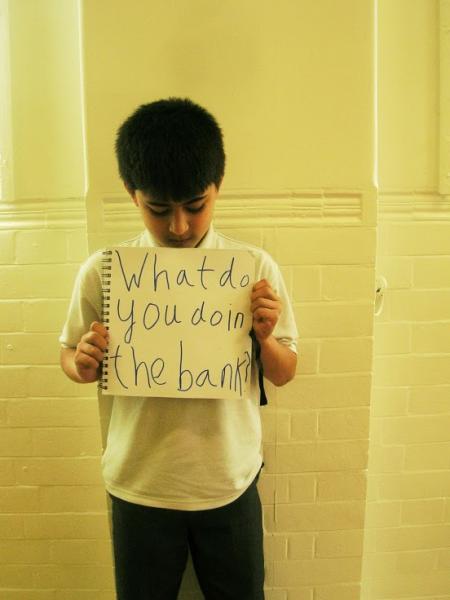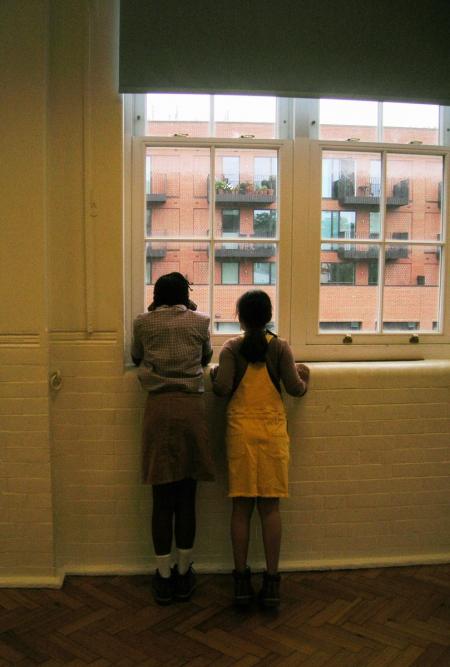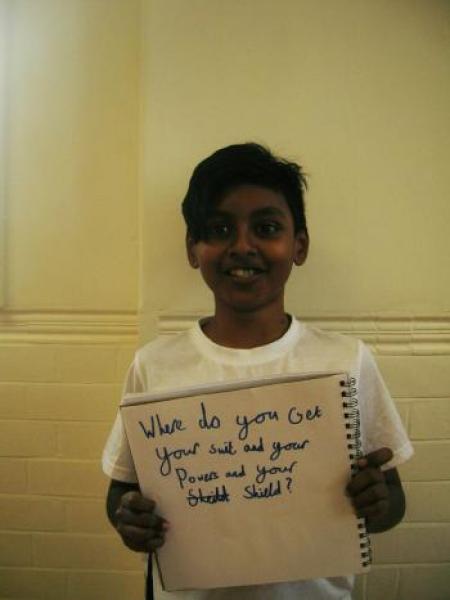Matthew Evans and Matt Ryan together run Gameshow theatre company. Their latest show Grown Up was initially conceived in 2015 and after a recent period of redevelopment it will beshowing at Camden People’s Theatre from October 27th-29th. Co-created by Gameshow & Emily Lim, Grown Up explores the gap between what we teach our children and what they really want to know. We meet five young performers on a mission to understand the world around them. They speak the words of adults from Camden, who answered the children’s questions in interviews. I had a chance to catch up with one of the Matthew’s (Evans), about how the show came into being and what we might expect.
Jesse Stanley: Has working with verbatim text always been something that has intrigued you as the basis for a new production?
Matthew Evans: Yes, and we’ve worked with text taken from interviews in Gameshow’s past projects Agatha at The Yard and HS2 Project at CPT. But we haven’t really thought about this show as verbatim theatre. Although every word spoken comes from our interview transcripts, we had to edit the these down a lot to make it fit into an evening’s performance. And our ten-year-old performers are just as important in the show as the grown up characters whose words they speak. We thought it would be more interesting to watch them digest and make sense of these words, rather than seeing them impersonate the interviewees.

JS: Were there common themes to the kinds of questions the kids were eager to ask?
ME: Yes, and they weren’t necessarily what you would expect. We gathered nearly 300 questions and, although some surreal ones stood out (“How do you survive in a crevice?”), we could also see clear trains of thought. The biggest preoccupation seemed to be the world of jobs and work (“How do you get a job?”), maybe the biggest difference between children and grown ups (in their eyes). Perhaps for the same reasons, body hair kept coming up too: “Do you shave your baby privates?”. A lot of the questions give a vivid picture of home life, from the hectic “How do you cook while looking after your babies?” to the touching “Why are mum and dad in divorce?”.
JS: How did you go about selecting your ‘young performers’ and what sort of qualities were you looking for?
ME: We have worked closely with Netley Primary School throughout the creative process. The school is just round the corner from the theatre and we’ve been really well supported by the staff, especially Assistant Head Gareth Morris. With his help, we ran a series of recruitment workshops last term. We knew we wanted to work with performers who would each bring something a bit unusual and intriguing on stage with them. But as a group they also had to somehow represent the grown ups we interviewed, and more broadly the grown ups of Camden and the wider world. Plus they had to be good at reading! We have ended up with five children who have never performed before and who are unforgettably magnetic on stage.
JS: Were there common themes to the kinds of questions the kids were eager to ask?
ME: Yes, and they weren’t necessarily what you would expect. We gathered nearly 300 questions and, although some surreal ones stood out (“How do you survive in a crevice?”), we could also see clear trains of thought. The biggest preoccupation seemed to be the world of jobs and work (“How do you get a job?”), maybe the biggest difference between children and grown ups (in their eyes). Perhaps for the same reasons, body hair kept coming up too: “Do you shave your baby privates?”. A lot of the questions give a vivid picture of home life, from the hectic “How do you cook while looking after your babies?” to the touching “Why are mum and dad in divorce?”.
JS: How did you go about selecting your ‘young performers’ and what sort of qualities were you looking for?
ME: We have worked closely with Netley Primary School throughout the creative process. The school is just round the corner from the theatre and we’ve been really well supported by the staff, especially Assistant Head Gareth Morris. With his help, we ran a series of recruitment workshops last term. We knew we wanted to work with performers who would each bring something a bit unusual and intriguing on stage with them. But as a group they also had to somehow represent the grown ups we interviewed, and more broadly the grown ups of Camden and the wider world. Plus they had to be good at reading! We have ended up with five children who have never performed before and who are unforgettably magnetic on stage.
JS: Were there common themes to the kinds of questions the kids were eager to ask?
ME: Yes, and they weren’t necessarily what you would expect. We gathered nearly 300 questions and, although some surreal ones stood out (“How do you survive in a crevice?”), we could also see clear trains of thought. The biggest preoccupation seemed to be the world of jobs and work (“How do you get a job?”), maybe the biggest difference between children and grown ups (in their eyes). Perhaps for the same reasons, body hair kept coming up too: “Do you shave your baby privates?”. A lot of the questions give a vivid picture of home life, from the hectic “How do you cook while looking after your babies?” to the touching “Why are mum and dad in divorce?”.
JS: How did you go about selecting your ‘young performers’ and what sort of qualities were you looking for?
ME: We have worked closely with Netley Primary School throughout the creative process. The school is just round the corner from the theatre and we’ve been really well supported by the staff, especially Assistant Head Gareth Morris. With his help, we ran a series of recruitment workshops last term. We knew we wanted to work with performers who would each bring something a bit unusual and intriguing on stage with them. But as a group they also had to somehow represent the grown ups we interviewed, and more broadly the grown ups of Camden and the wider world. Plus they had to be good at reading! We have ended up with five children who have never performed before and who are unforgettably magnetic on stage.
JS: Were there common themes to the kinds of questions the kids were eager to ask?
ME: Yes, and they weren’t necessarily what you would expect. We gathered nearly 300 questions and, although some surreal ones stood out (“How do you survive in a crevice?”), we could also see clear trains of thought. The biggest preoccupation seemed to be the world of jobs and work (“How do you get a job?”), maybe the biggest difference between children and grown ups (in their eyes). Perhaps for the same reasons, body hair kept coming up too: “Do you shave your baby privates?”. A lot of the questions give a vivid picture of home life, from the hectic “How do you cook while looking after your babies?” to the touching “Why are mum and dad in divorce?”

JS: How did you go about selecting your ‘young performers’ and what sort of qualities were you looking for?
ME: We have worked closely with Netley Primary School throughout the creative process. The school is just round the corner from the theatre and we’ve been really well supported by the staff, especially Assistant Head Gareth Morris. With his help, we ran a series of recruitment workshops last term. We knew we wanted to work with performers who would each bring something a bit unusual and intriguing on stage with them. But as a group they also had to somehow represent the grown ups we interviewed, and more broadly the grown ups of Camden and the wider world. Plus they had to be good at reading! We have ended up with five children who have never performed before and who are unforgettably magnetic on stage.
JS: Were you surprised by the kids’ insight on any topics that adults expect children to be oblivious to?
ME: To answer a question with questions: Why do every people not have food? How would you carry on with your job if something bad happened to your family? How do you look after your mum and dad when they get old? Who will take care of you? Is it hard to let go of past memories?
JS: Were the kids ever suspicious that the adults had censored their answers or avoided a truthful response?
ME: No, that doesn’t seem to have been a concern for them. At first there was a rule for the interviews that only the children’s questions would be asked. This got frustrating at times when we wanted to hear more, so we ended up doing another round of interviews with more freedom. Some of the grown ups still self-censored, but over the course of the show we get a personal insight into each of their lives.
JS: Were there any questions (posed by the kids) that your adult interviewees were unexpectedly struck by?
ME: One of my favourite questions was “Can you tell me how I can become like a power ranger?” and this got unexpectedly earnest responses about use and abuse of power, leadership and social responsibility. Likewise, “Where did you get your suit and your powers and your shield?” was interpreted literally (“TM Lewin”), metaphorically (“My shield is my dignity”) and with a sense of humour (“My powers are the power of the imagination and fart management”).

JS: What has been the most informative aspect of working with ‘untrained’ performers?
ME: Emily regularly creates community work with non-professional performers and we also work with non-professionals on and off stage with many of Gameshow’s projects. We want the cast to be themselves on stage and in some ways this is easy to achieve because ten-year-olds don’t have the same self-awareness as adults, or even the self-conscious traits that children just a few years older quickly acquire.
To purchase tickets for Grown Up, click here. This show is suitable for ages 10+ and starts at 7pm sharp. £12 at the door, £10 concession.
1) Has working with verbatim text always been something that has intrigued you as the basis for a new production?
Yes, and we’ve worked with text taken from interviews in Gameshow’s past projects Agatha at The Yard and HS2 Project at CPT. But we haven’t really thought about this show as verbatim theatre. Although every word spoken comes from our interview transcripts, we had to edit the these down a lot to make it fit into an evening’s performance. And our ten-year-old performers are just as important in the show as the grown up characters whose words they speak. We thought it would be more interesting to watch them digest and make sense of these words, rather than seeing them impersonate the interviewees.


